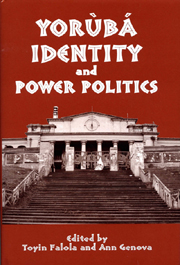Book contents
- Frontmatter
- Contents
- List of Illustrations
- Introduction
- Part I Writing Yorùbá
- Part II Chiefs and Tradition
- Part III Identity and Modern Politics
- 12 Approaching the Study of the Yorùbá Diaspora in Northern Nigeria
- 13 Yorùbá-Nigerians in Toronto: Transnational Practices and Experiences
- 14 Yorùbá Factor in Nigerian Politics
- 15 Politics, Ethnicity, and the Struggle for Autonomy and Democracy
- 16 Petroleum and Ethno-Politics
- 17 Chief M. K. O. Abiọla's Presidential Ambitions and Yorùbá Democratic Rights
- Notes on the Contributors
- Index
15 - Politics, Ethnicity, and the Struggle for Autonomy and Democracy
from Part III - Identity and Modern Politics
Published online by Cambridge University Press: 12 September 2012
- Frontmatter
- Contents
- List of Illustrations
- Introduction
- Part I Writing Yorùbá
- Part II Chiefs and Tradition
- Part III Identity and Modern Politics
- 12 Approaching the Study of the Yorùbá Diaspora in Northern Nigeria
- 13 Yorùbá-Nigerians in Toronto: Transnational Practices and Experiences
- 14 Yorùbá Factor in Nigerian Politics
- 15 Politics, Ethnicity, and the Struggle for Autonomy and Democracy
- 16 Petroleum and Ethno-Politics
- 17 Chief M. K. O. Abiọla's Presidential Ambitions and Yorùbá Democratic Rights
- Notes on the Contributors
- Index
Summary
This chapter focuses on the place of the Yorùbá in the perennial struggle for democratization and national integration in Nigeria. The Yorùbá occupy a strategic position in the scheme of things in Nigeria today. Since 1993, following the cancellation of the result of the presidential elections that were held that year and won by a Yorùbá man, the Yorùbá have been at the center of the sociopolitical crisis that has dominated Nigerian affairs and poisoned inter-group relations in the country. Between 1993 and 1998, more than at any other time since the Biafran Civil War (1967 to 1970), the fate of Nigeria, the validity of its continuing existence as a corporate entity, was severely threatened. Like the Igbo before them, the Yorùbá, feeling entirely alienated and chafing under the mindless terror of General Sanni Abacha's regime, became the champions of the struggle for a return to true federalism or the dissolution of Nigeria into its many component parts. The choice or even “imposition” in 1999 of only Yorùbá presidential candidates by all the political parties in the country was a compromise to forestall and stem the relentless slide into disintegration. Using an array of sources, primary and secondary, this paper carries out a historical exploration of the origins, the nature, and the dynamics of the Yorùbá interactions with the Nigerian polity.
- Type
- Chapter
- Information
- Yorùbá Identity and Power Politics , pp. 297 - 315Publisher: Boydell & BrewerPrint publication year: 2006

